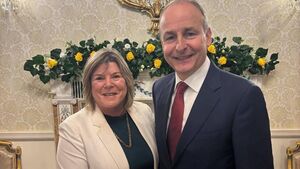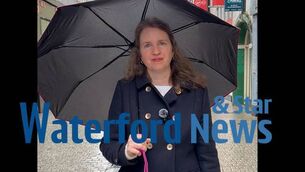"The honour of my life": Minister Butler reacts to appointment as Chief Whip

The new Government Chief Whip Mary Butler with Taoiseach Micheál Martin.
Waterford TD Mary Butler said she is "delighted" to be appointed as Government Chief Whip in the newly formed cabinet.
The position, which is a super junior ministership, is set to play a significant role in the government's term but will leave the Déise short of a senior minister.
The Fianna Fáil TD will have responsibility for Mental Health as chief whip, a thematic continuation of her role in the previous government as Minister of State in the Department of Health with responsibility for Mental Health and Older People.
“It is the honour of my life to serve in this role and it wouldn’t have been possible if the people of Waterford hadn’t put their faith in me since 2016," Minister Mary Butler said.
“Sitting in Áras an Uachtaráin for the first Cabinet meeting last night was a pinch-yourself moment. It is hard to put it into words and describe the feeling when you arrive, and the President is there waiting for you. The memories of the formal ceremony in which I was presented to the President as the Government Chief Whip are ones which I’ll cherish for the rest of my life."
“It’s a role I’ve been interested in throughout my time in national politics and one which I always felt I’d love the opportunity to do," she said. "The Office is essentially charged with ensuring the Dáil business of the day runs smoothly so that Ministers and Deputies can conduct their work freely and efficiently."
In addition to serving as Chief Whip, the Waterford TD will have responsibility for mental health, which she said would allow her to "continue to push and deliver expanded cardiac care services for Waterford and the South East".
The Government Chief Whip is a Minister of State at the Department of the Taoiseach and does attend cabinet meetings. Such Ministers of State, who attend cabinet are referred to as super juniors. In this position, Minister of State Butler will attend cabinet meetings but will not have a vote at the table or be one of the 15 formal members of the government.
The Minister of State in this position is responsible for 'whipping-in' the elected members of the government parties - a term derived from the English tradition of a hunt having an assistant who ensures the hounds on a hunt stay inside the pack. Similarly in parliamentary politics, the 'whip' is expected to ensure that the government voting block does not splinter and will vote according to the party and government line.






